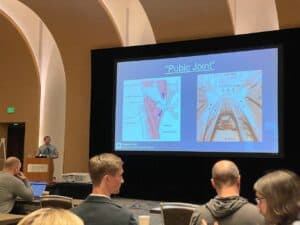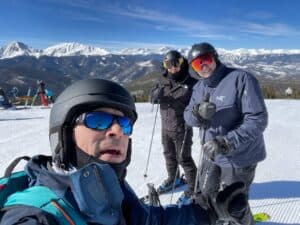

In March of 2023, the Abdominal Core Health Quality Collaborative (ACHQC) held their annual quality improvement summit in Denver, Colorado. Surgeons from all over the country attended the summit to analyze data and share critical insights into improving surgical decision making and techniques to ultimately maximize patient outcomes after hernia surgery. Dr. Reinhorn, who has a special interest and expertise in hernia surgery, was one of the 50+ surgeons who attended the summit.
One of the key takeaways from the summit was the ongoing progress being made to improve patient pain management through the efforts of the Opioid Task Force. Dr. Reinhorn has been instrumental in reducing his own opioid prescribing from 10 tablets to zero for most patients (about 90%) and has also encouraged other surgeons to do the same. Research indicates that patients often require much less opioids than are typically prescribed, and can still recover comfortably without excessive medication. Many surgeons attending the summit have already reduced their opioid prescribing since the implementation of this Task Force, with some, such as Dr. Reinhorn and Dr. Fullington, regularly choosing not to send patients home with opioid prescriptions after elective hernia surgery. Looking ahead, the ACHQC hopes to conduct a multi-center trial to evaluate the efficacy of zero vs 5 tablet prescribing, measuring patient opioid use and satisfaction with pain control.
At the summit, there was a review of data related to “sports hernia,” which revealed a significant gap in knowledge regarding the treatment of this musculoskeletal injury. Despite the name, a sports hernia is not actually a hernia, but rather an injury to a tendon or muscle in the lower abdomen or groin area that can cause chronic pain. These core muscle injuries are often the result of repetitive and forceful twisting of the pelvis. Fortunately, this type of injury can be treated with physical therapy, medication, and/or surgery. The providers at Boston Hernia recognize the importance of non-surgical treatment for core muscle injury and advocate for its use whenever possible.
Dr. Reinhorn had the opportunity to moderate a session on inguinal hernia, where valuable insights were shared on surgical techniques and patient outcomes. At Boston Hernia, we specialize in the OPP/TREPP inguinal hernia repair, which is a posterior mesh repair that allows for fast recovery. This fast recovery repair is done through a small incision in the groin and is typically performed under local anesthesia with sedation when appropriate. This repair technique has been found to be an excellent alternative to laparoscopic or robotic surgeries, particularly for patients with a BMI under 33.
Overall, the summit was an excellent opportunity for Dr. Reinhorn to listen to various talks on improving patient outcomes in inguinal and ventral hernia, collaborate with other experts in the field, and discover new ways to improve patient care back home in Boston. He even took a couple of extra days to continue the discussion about hernia research on the chairlift while skiing at Keystone with Drs. Warren, Krpata, and Rosen! Check out the ACHQC website to learn more about their various initiatives in improving patient care and outcomes in hernia surgery. The providers at Boston Hernia appreciate all of our patients who participate in the ACHQC surveys, which help us to continuously grow and improve our care of future patients.
